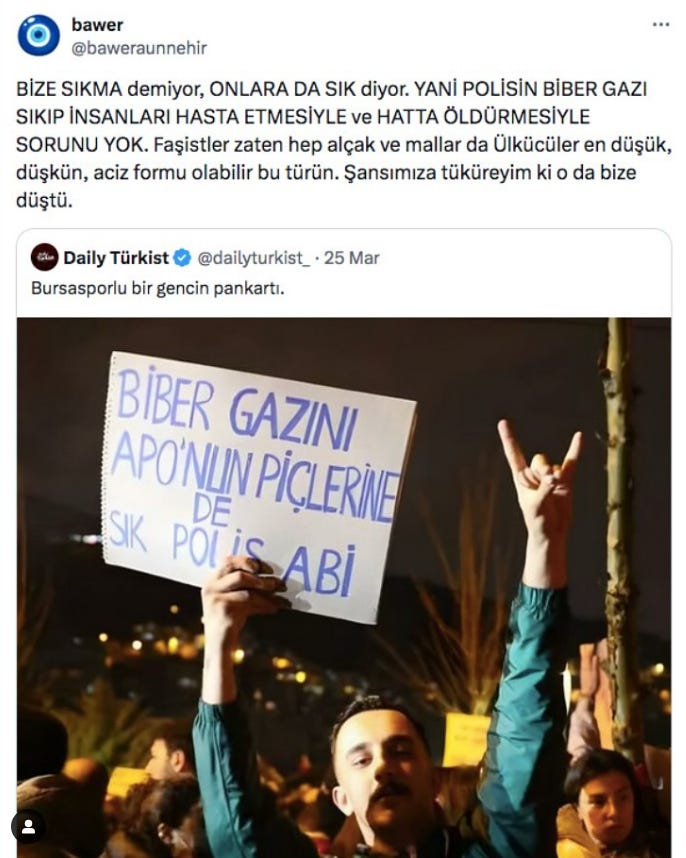My Complex Relationship with My Nationalit[ies]
Sometimes, you have to admit your weakness and rationalise them.
It has always been hard for me to explain what I am and where I come from.
If I want to be fully transparent, I have to be specific, but to be specific, I need to recite an ethnography dissertation that most people don’t have the wherewithal to grasp (usually for no fault of their own) or simply don’t care about.
If I want to be concise, I can just name my countries, the geopolitical states which encompass my maternal and paternal homelands, but not only does that feel like cultural erasure of some sort, it’s also… kind of shameful?
discussion CONTENT WARNINGS: genocide and ultranationalism, ethnic slurs, disturbing imagery, hate speech, far-right extremist symbols, fascism.
In March on 2025, nation-wide protests erupted in Türkiye in response to dictator Recep Tayyip Erdoğan’s jailing of İstanbul mayor and opposition leader Ekrem İmamoğlu, the candidate for the CHP, Cumhuriyet Halk Partisi, or the Republican People’s Party, a Kemalist and social democratic party founded upon the teachings of Mustafa Kemal Atatürk himself.
But let’s actually contextualise this.
Erdoğan (AKP) has been prime minister since 2003 and president since 2014, with increasing authoritarianism throughout.
İmamoğlu (CHP) is touted as a “social democrat”.
While many members of Cumhuriyet Halk Partisi have voiced support for LGBT and feminist movements, it cannot be overlooked that the party, in fact, Kemalist.
Kemalism (Kemalizm), or Atatürkism (Atatürkçülük), emerged in the 1930s as a reform effort and nation-building mechanism in the face of the crumbling Empire (that would be the Ottoman Empire), based on the ideology of mareşal Ali Rıza oğlu Mustafa (1923–1938), better known as Mustafa Kemal Atatürk, or simply Atatürk. “Father of the Turks”. He is credited with the establishment of the Republic of Türkiye, introducing wide-sweeping reforms, and secularising and Westernising the nation post-Empire. He was also not a Turk.
The Six Arrows (Altı Ok) is the symbol of Kemalism, each arrow representing the ideology’s principles: republicanism (cumhuriyetçilik), populism (halkçılık), nationalism (milliyetçilik), Laïcité/secularism (laiklik), statism (devletçilik), reformism (inkılapçılık).
Kemalism, however, transmogrified into an ethnofascist dogma hostile to non-Turkish identities, with Atatürk famously saying, “Ne mutlu Türküm diyene.” “How happy is the one who says I am a Turk.” The Turkish History Thesis, a nationalist and pseudohistoric theory, emerged under Atatürk, falsely claiming Turkish ownership of vast swathes of the globe and promoting pan-Turkism, an ideology rooted in ethnic cleansing and genocide of indigenous populations. Atatürk’s tactics went as far as attempting to remove Arabic, Persian, Greek, etc. loanwords from Turkish. To “purify” the Turkish language, as was cited. Ethnic cleansing, even… Non-Muslim peoples in what became Türkiye were treated as second-class citizens despite the supposed principle of laiklik, and Atatürk’s era was where the anti-Kurdish slur //TW// Dağ Türkleri, “Mountain Turks”, emerged as a way to deny the Kurdish identity. To erroneously claim Kurds are just a type of Turk deluded into thinking they’re something else. They, Kemalists, knew they were wrong, but that’s not the point—not one that matters, anyway. Turkish Turks even took that derogatory euphemism to Germany, where most of the diaspora is, and Germanised it. //TW// Bergtürke.
“We have citizens and co-nationals in the contemporary Turkish nation who wish to propagate notions about Kurdish-hood, Circassian-hood, and even more so Laz-hood or Bosnian-hood, inside of the political and social collective. But this false naming, a product of the despotism of the past age favouring no-one but a few reactionary tools of the enemy and imbeciles, has no other effect on the nation other than worry and stress. Because the individuals of this nation, like the whole Turkish community, are in possession of a common past, history, morality, and law.”1
Minister Şükrü Kaya, one of the architects of the Armenian Genocide and a source I quoted in my essay on Romaphobia in entertainment media whilst discussing anti-Romani sentiments in Türkiye, had also stated,
“No matter what happens, it is our obligation to immerse those living in our society in the civilisation of Turkishness and to have them benefit from the prosperity of civilization. Why should we still speak of the Kurdish Mehmet, the Circassian Hasan or the Laz Ali? This would demonstrate the weakness of the dominant element… If anybody has any difference inside of him, we need to erase that in the schools and in the body politic, so that man will be as Turkish as me and serve the homeland.”
We witness here a positioning of Turkishness as civilised beside those Otherised barbarians, and a concerted effort towards ethnic erasure and cultural genocide which continue to this day with land theft, Turkification,2 funding, abetting, and direct perpetration of indigenous ethnic cleansing, anti-immigrant pogroms, permission of resource flow to the Zionist settler colony, imperialism in the region and elsewhere, and even president Erdoğan attempting to claim Newroz as Turkic after decades of persecuting Kurds for celebrating the ancient New Year festival.
The CHP’s appeal to halkçılık, populism, a rejection of the supposed “despotism” of the Ottoman era—this “anti-establishment” the Kemalist doctrine purports—is, in essence, a manipulation of the populace. To be “anti-establishment” is not to have a cohesive political orientation, because The Establishment™ can be anything. In an anarcho-communist confederation, to be a proponent of slavery is “anti-establishment”, but that is not a good thing. “Anti-establishment” is ultimately something that sounds good and sounds revolutionary, but is vague, context-dependent, and thus cannot be relied upon to bring about tangible social progress. Halkçılık is rooted in “Us vs Them”, but where is the line drawn? When does “Us” become a narrow ethnocentric determiner, and “Them” a “foreign outsider” that needs to be eliminated from society? Really fvcking fast, actually. Populism (halkçılık) coupled with nationalism (milliyetçilik) creates a sort of popular social nationalism. A national socialism, if you will…
Fascism!
Now, I don’t plan to do a political analysis here.
This essay is about me!
It’s about my complex relationship with my countries. What it’s like for me to witness societal upheaval of both and feel a sense of tainted pride intertwined with jadedness at knowing, likely, that nothing will shift at the marrow.
Before we proceed, I will not accept obtuseness and reductionism aimed at me and how I feel apropos of this topic. The reality is that you couldn’t even fathom what it’s like to be Turkish and Russian by nationality, and ethnically minoritised in both contexts, including being indigenous. Stay in your lane—you quite literally have no idea what you’re talking about.
I will also not accept anti-Russian or anti-Turkish sentiments in the comments. I’m still Turkish and Russian by nationalit[ies], even if I’m minoritised and even if I’m severely critical of and disenchanted with those two colonial entities. Critique and call-outs of oppressive systems and how the majoritarians within those systems perpetuate them is not xenophobia (no matter how uncomfy you as a majoritarian get hearing said critique—imagine what being materially minoritised is like), but using such call-outs as an excuse to spread hate speech and slurs against majoritarians for the love of the game is. Ethnic abuse is what the majoritarian ethnofascists are here for. You do better.
And Westerners? This is not your moment to commentate. All you ever do is talk. Literally for one single second leave me alone, чёрт бы вас побрал.
KURTULUŞA KADAR SAVAŞ
The scenes from the Turkish protests are apocalyptic. Demonstrators being hosed down with biber gazı and tear gas, riot police abusing young women, fire everywhere.
Yet…3

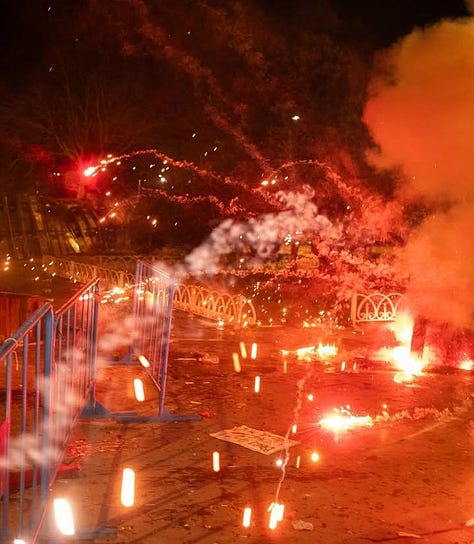

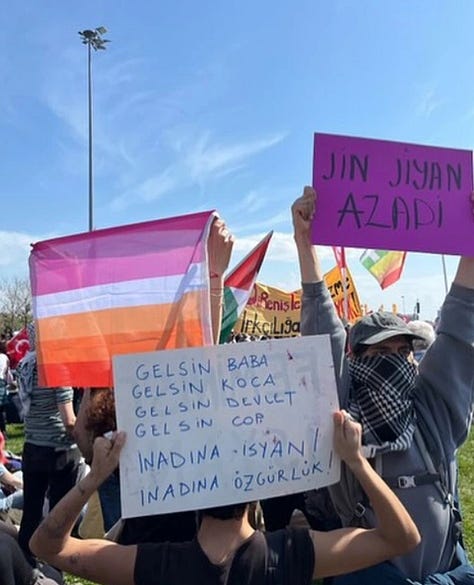
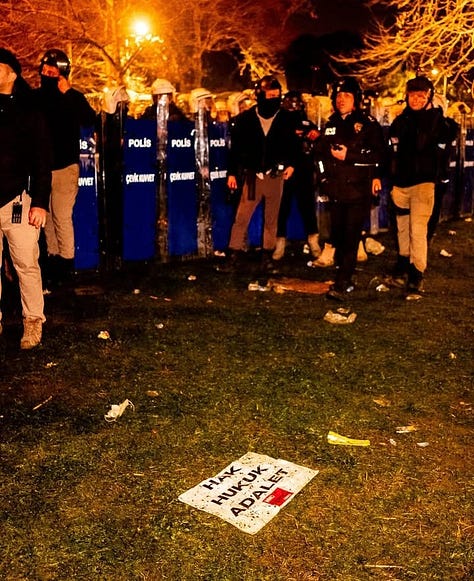
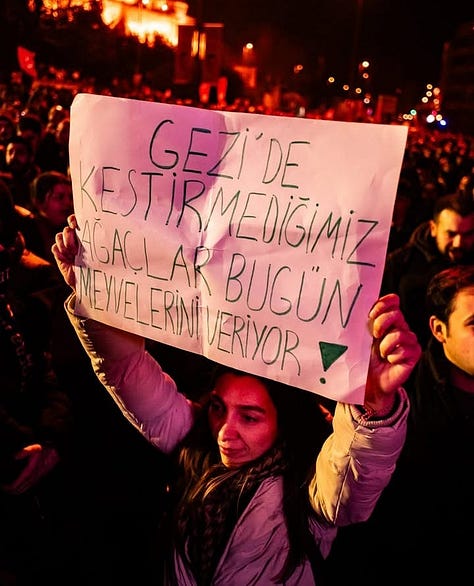
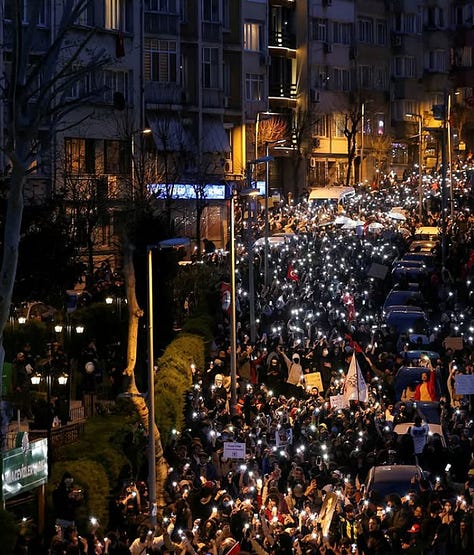


There is unity, solidarity, love, strength, hope, an earnest yearning for progress, democracy, isyan, devrim, özgürlük, adalet. It makes my heart swell. These photographs, for the first time in a while, make me genuinely want to call myself “Turkish” again and not even explain myself. There was a time, long ago, when I had the 🇹🇷 and 🇷🇺 flags in my bio (alongside 🇬🇪 and 🇦🇲 because I was always, to some degree, cognisant of the terrible optics). I’m so proud of our young people, but not just young people—everyone is here. Everyone wants change.
And yet…
There’s something evil right there in plain sight and broad daylight.4
//TW//


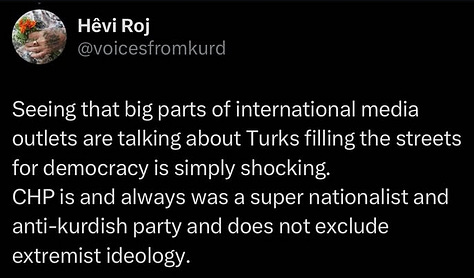
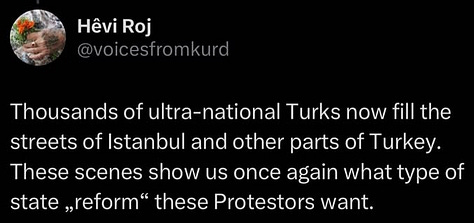

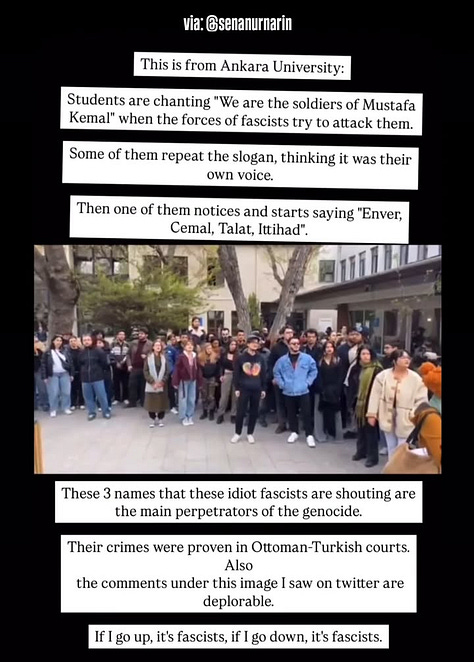






Veneration of a racist dictator, chants for murder of proxies for an ethnic minority, fascist hand symbols, racial violence, hate speech…
It’s like there are two different protests happening side-by-side.
There are people pushing back against these displays, of course—5
—but it makes one quite despondent, looking at these demonstrations, wanting to feel pride and hope, and perhaps still feeling some notwithstanding, yet noticing so much bigotry and unaddressed societal tension. One bad apple sours the whole bunch, as it were. It’s also pretty telling that the responding tweet above is by someone named “Bawer”, Kurdish for “faith”, implying they’re likely Kurdish (i.e., minoritised) whilst the tweet being quote-retweeted, uncritically featuring a photograph of a man throwing up the Grey Wolf6 hand symbol—an analogue of the Sieg Heil salute—was posted by some “Daily Türkist”: a loud-and-clear pan-Turkist dogwhistle. Basically, it is almost always the minoritised people themselves calling these sickos out, and not majoritarian allies.
It is not just a vocal minority, or even an especially loud subset, perpetuating far-right ideas, either. This Banality of Evil is baked into society. Pseudo-history, historical revisionism, genocide denial are taught in schools, perpetuated on the political stage, advocated for in international courtrooms. And anyone pointing out these very real injustices are dubbed “divisive” and “sectarian”. It’s “not the time”, but apparently it’s the time to throw up the Bozkurt salute under which ethnic cleansings are carried out quite literally as I write this and likely as you read it? That symbol is frighteningly normalised, though, so I guess I can’t be too shocked, and I’m frankly not.
Everyone wants change, but what kind? The kind that improves? Or the kind that makes worse? When Wagner revolted against Putin, they wanted change too: they thought Putin wasn’t being violent enough in Ukraine. And I’m not showing the parallels of this in the Russian contexts because I don’t need to. Just look at those photos of racist bigotry and replace the Turkish language with Russian—it’s exactly the same. One coin, two faces.
Disappointing, is what it is.
I always feel shame when I miss my birth country, or when I enjoy the cultures of my two homelands, or when I feel drawn to the Turkish language no matter how on edge I feel when I catch sight of it (what if it’s a racist nationalist? Seeing the Turkish flag coupled with the wolf emoji—🐺—on social media is so scarily common and cannot be divorced from Bozkurt fascists). I’m so cognisant of the colonial violence that saturates both Russia and Türkiye, that there’s nothing of those countries left to salvage, and it makes me quite frankly distraught that I cannot be straight-forward about my nationalit[ies] without shame, even though I know I’m just being whiny—Ukrainians and Georgians and Noxçiy and Armenians and Rojava Kurds are being bombed and threatened with colonisation and mass murder whilst I’m here sulking about my “cOmpLex feEWeeNgs” over geopolitical entities that treat me, an ethnic minority in both contexts, with just as much racism anyway.
I saw this tweet recently:
The same thing has been said about Russians—that nationalism just runs too deep to ever be excised. That Russians are “slaves” to their very DNA. What if they’re right? What if it’s true? What if our countries are unsalvageable?
Yet I don’t know how to let go of the sentimentality I still harbour, or if I even truly want to. What if our countries aren’t unsalvageable? What if change for the better will come? Germany improved, sort of…
But how do I overlook the violence I’ve grown to be so aware of?
I cannot shut my eyes now that the veil has been torn.
Tragic as it may be, the truth I fear I must accept is that there can be no democracy in or beneath these banners. Definitely not now, and possibly not ever.
These countries are founded on ethnonationalism, indigenous erasure and genocide, and the suppression of cultural diversity to the point of outlawing entire practices and languages. Both had their own [Majority]-cation—Turkification, Russification—projects which left millions of indigenous, minoritised, and otherwise marginalised people dead, and irreparably damaged the social fabrics of their respective societies. I mean, the parallels are glaring down to the spark of the Turkish protests: Erdoğan’s imprisonment of political opponent İmamoğlu. It’s an entire running joke that all of Putin’s opposition ends up either jailed or “fallen off a balcony” or “dead by suicide with a bullet to the back of the head” (all pretty fvckin’ gross sht for privileged Westerners to do a little tee-hee about, might I add). Plenty a-protest “for democracy” has erupted in the RF in support Putin’s opposition despite said opposition’s, while outward “liberalness”, actual bigotry.
When it comes to nation-wide anti-governmental protests, the fundamental issue is that these are two deeply ill societies attempting to heal surface wounds without addressing the core malady rotting them from the inside.
A change in leadership could propel the political landscape accordingly, sure, but what exactly is being done to dismantle the rabid, violent ultranationalism and ethnofascism that remains the backbone of social culture? İmamoğlu himself, regardless of his supposed “social democrat” label, is a representative of a nationalistic, populist Kemalist party, and Turkish nationalism will always be fascistic to the bone. Putin can be dethroned, yes, but a society with so much unaddressed trauma is likely to beget a successive leader just as bad. It almost happened with the Wagner coup; dare I say, Prigozhin could have been leagues worse (I really doubt İmamoğlu would be worse than Erdoğan, though, but being part of the state warps people towards authoritarian tendencies).
Mere change in leadership does not upheave the institutions of racism and ethnic discrimination underpinning societies that do not want to confront or acknowledge the existence of either. The racists and right-wingers are a no-brainer, obviously, but ethnocentrist nationalism percolates to the liberal and even leftist components of society, especially in countries where it was foundational to nation-building. Neither Russian nor Turkish left-leaners, even those ardently pro-LGBT, even feminists, ever seem to want to tackle the subject of colonialism. There’s seldom, if ever, a wish to genuinely sit with discomfort. To question racist structures and thought (just look at Ekaterina Schulmann). To acknowledge the disproportionate discrimination that ethnic minorities experience—that majoritarians are not oppressed in the same way minorities are by dictators, even if they’re both oppressed.
Why not?
Why don’t left-leaning majoritarians consider colonialism a worthy issue to tackle? Why is there a lack of want to question one’s own ethnic biases rooted in institutionalised nationalism?
Well, first of all, it’s because the populations of both of these countries are quite literally taught falsified history which never happened, Türkiye especially.
But also because these left-leaning Rossiyane/Türkiyeliler7 are ✨pro-queer-pro-femme-progressives✨, right? And İmamoğlu publicly said saccharine things like “Türk, Kürt, Laz, Ermen, Rum, Çerkez yani kısaca bu şehrin, bu milletin asil evlatlarına teşekkür ederim” instead of Erdoğan’s disgusting “kılıç artıkları” about genocide survivors! Oh, and Alexei Navalny orated for “democracy” and “freedom”—“We must do what they fear: tell the truth, spread the truth”—whilst Putin gets up on the podium and spews hogwash like “modern Ukraine was wholly and fully created by Bolshevik, communist Russia”! And they, these left-er Rossiyane/Türkiyeliler in question, support İmamoğlu and Navalny not Erdoğan and Putin, so they must be of clean conscience! Ignoring the CHP’s very bedrock of racial supremacism (just go read that Şükrü Kaya gibberish again), or Alexei Navalny’s past of far-right extremism where he called Kavkazians “cockroaches”.
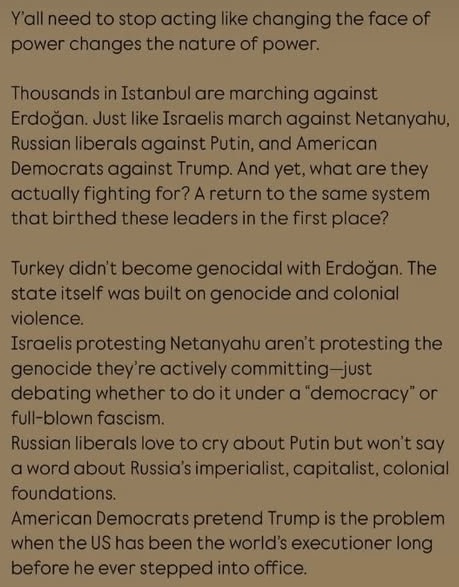
That’s what it is. Ignoring. La-la-la—shut your eyes and ears to it because suddenly it’s you under the magnifying glass. Suddenly you, say, a queer woman, are the oppressor in a dynamic where ethnicity is involved.
I don’t see an end in sight.
The road forward is grim, and that saddens me immensely.
Bearing witness to the 2025 Turkish demonstrations is like seeing those anti-war 2022 protests in the RF all over again. I’m always standing here, watching one or both of my countries self-immolate for show, yet never to atone.
Bir gün her şey çok güzel olacak, ama o gün biz olmayacağız.
One day everything will be beautiful, but we won’t be there…
~Sfar~Ⓐ🧿֎⨳
Afet İnan, A. (1988). Medenı̂ bilgiler ve M. Kemal Atatürk’ün el yazıları [Civil information and handwritings of M. Kemal Atatürk]. Türk Tarih Kurumu [Turkish Historical Society].
Göner, Ö. (2017). Turkish National Identity and Its Outsiders. Taylor & Francis.
Translations—
1: “The queers you killed are here too.”
3: “Women and queers want peace.”
4: > “Come father, come husband, come state, come cop. Rebellion in spite of it! Freedom in spite of it!”
> “Jin, jîyan, azadî!”
“Woman, life, freedom” in Kurmancî (Kurmanji), a phrase originating from the female resistance fighters of Rojava (Western/Syrian Kurdistan; DAANES), becoming also the slogan of the Irânian protests following the brutal murder of Kurdish-Irânian woman Jîna Emînî by the IRGC on 16th September 2022. The chant is often Persianised and divorced from its original decolonial Kurdish roots.
5: “The trees you couldn’t cut down at Gezi are bearing fruit today.”
Referencing the Taksim Square/Gezi Park protests of 2013 for freedom of speech, right to assembly, freedom of the press, and the resignation of the Erdoğan government. Protests which were ultimately symbolic and brought about little tangible change, just like the Russian anti-war protests.
6: “Truth, law, justice.”
8: “Yesterday: Kurds, queers, wom+n, immigrants, students. Today: everyone.”
Translations—
2: “Cotton candy for Apo’s bastard, pepper spray for us, eyvallah.”
Apo is Kurdish for “uncle”, referencing here Abdullah Öcalan, the founder of the Kurdistan Workers’ Party (PKK) who is currently under solitary confinement in İmralı prison where he is the sole detained. A democratic confederalist, an advocate of Jineolojî—a type of gender equality praxis, and oft-times the face of the Kurdish resistance. “Apo’nun piçine”, “Apo’s bastard” therefore becomes a euphemism for Kurds.
Eyvallah is a colloquial way of saying “thanks”.
7: “Everything will be so beautiful.”
With a photo of İmamoğlu alongside Turkonationalist ethnic supremacist Atatürk. “Beautiful” for who?
9: “Good Greek president” written in Greek.
It’s a common xenophobic dogwhistle in Türkiye to imply that a disliked politician is actually Greek. Odd, when derogatorily calling Erdoğan “Gürcü” is right there considering he literally is one.
Translations—
The banner:
“Pepper spray Apo’s bastards too, officer.”
As per the previous footnote, this banner essentially says, “Pepper spray the Kurds[…]”.
The tweets:
> “He is not saying DO NOT SPRAY US, he is saying SPRAY THEM TOO. In other words, he has no problem with the police pepper-spraying the people and injuring or even killing them. Fascists are always vile anyway, and the Idealists are surely the lowest, most despised, and helpless form of this species. Damn our luck that this befell us too.”
> “Banner of a young Bursaspor fan.”
The caption of the Instagram post (where this screenshot was sourced) reads on repeat:
“Now repeat after me: PEPPER SPRAY IS A CHEMICAL WEAPON AND SHOULD NOT BE USED AGAINST ANYONE, EVEN YOU, AND SHOULD BE BANNED IMMEDIATELY!”
Mentioned in the previous footnote, “Idealists” refers to the “Idealist Hearths”, or Ülkü Ocakları, more commonly known as Bozkurtlar, the Grey Wolves, a far-right, ultranationalist Turkish organisation involved throughout its existence in violent racial and ethnic hate crimes. Notably, they were part of the perpetrators of the December 1978 Marash Massacre, a crime against humanity wherein far-right ultranationalists killed almost 200 leftists and Alevi Kurds, injuring some 3000 more. Bozkurtlar widely use fascist slogans, and have been known to collaborate with the CIA.
Alparslan Türkeş, the Bozkurtlar founder, said of the hand symbol: “The little finger symbolises the Turks, the index finger symbolises İslâm, the ring—or snout—symbolises the world. The point where the remaining three fingers join is a stamp. It means: we will put the Turkish-İslâmic stamp on the world.”
Darkly yet hilariously, Alparslan Türkeş was from a TsCypriot family part of which immigrated from Mažak (“Kayseri”) in Central Anatolia, likely making him not an ethnic Turk at all. Bolsahye journalist Hrant Dink (հանգչիր խաղաղությամբ) alleged Türkeş may have potentially even been of Armenian descent, which would line up with a Mažak origin given its Armenian history. Just goes to show that marginalised ethnicity won’t make you immune to far-right radicalisation. Some of the biggest racists I’ve met have been minoritised themselves, including in the topical context of Türkiye and Russia. Ogün Samast, Hrant Dink’s killer, was a Turkified Rum, after all.
I’m using those terms specifically because, unfortunately, and as brought up in the previous footnote, it’s not 100% of the time only ethnic Russians/Turks (Russkiye/Türkler) who are bought into their nations’ respective ethnofascisms.
Rossiyanin (россиянин)/Türkiyeli is a Russian/Turkish person, though not necessarily in an ethnic sense like Russkiy (русский)/Türk. It’s like the Yahudi/Musevi and Yevrey/Iudey (Еврей/Иудей) distinction except it’s also not.







